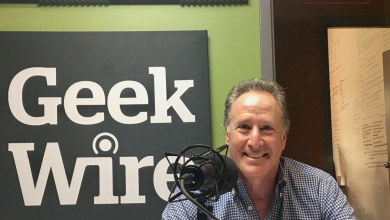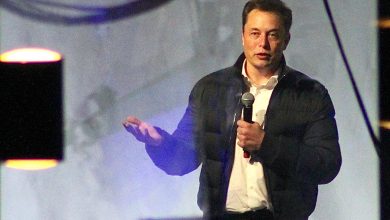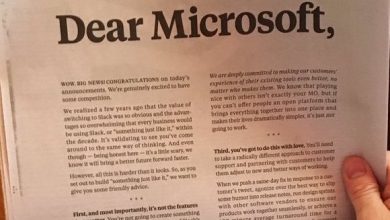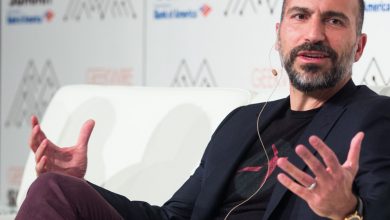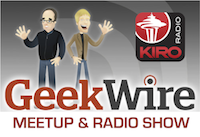A conversation with Microsoft co-founder Paul Allen: ‘It really is a golden age of what’s possible’
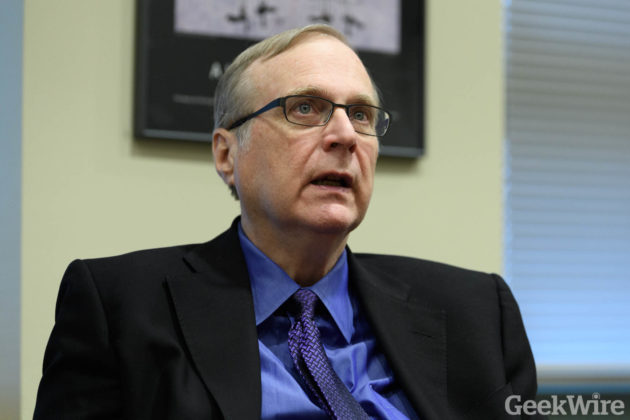
If Paul Allen were just starting out in computer science today, he might not know where to start. Robotics, artificial intelligence, computer vision, augmented reality, biological systems — the list of topics that fascinate him is practically endless.
“It’s amazing,” Allen said, marveling at the advances in technology and the potential to change the world. “Kids these days have so much more computer power, so much better tools at their disposal. It really is a golden age of what’s possible.”
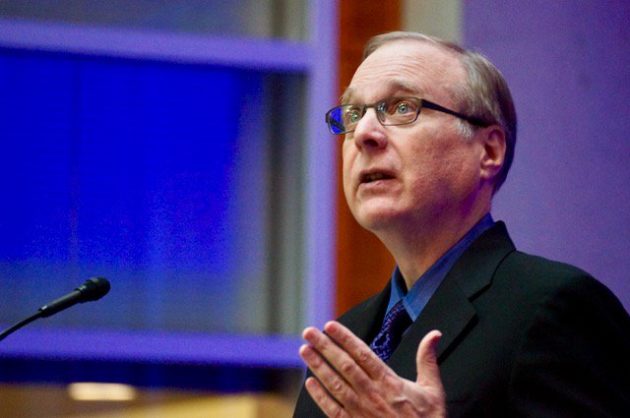
The Microsoft co-founder sat down for a conversation with GeekWire after making a special appearance Thursday afternoon at the University of Washington in Seattle. The UW announced Thursday that Allen is donating $40 million to its computer science program, and Microsoft is adding $10 million in honor of Allen to bring the total contribution to $50 million — a game-changing endowment for an institution that helps to fuel the regional economy with technology talent.
Allen discussed topics including his history with the UW, the recognition from Microsoft, what’s next for his Stratolaunch space venture, and the technologies and global issues most important to him and his Vulcan investment company. Continue reading for an edited transcript of the discussion, and listen below to a podcast that includes Allen’s public remarks at the event and our backstage conversation afterward.
Todd Bishop: Paul, you’ve had such a rich history with this institution, which is amazing, because I don’t think you ever technically enrolled here.
RELATED: Microsoft co-founder Paul Allen makes landmark $40M gift for University of Washington computer science school
Paul Allen: You know, I was trying to remember, because it feels like I took a summer course a couple of times. At the time I selected Washington State for my undergraduate program, because they had an undergraduate degree in computer science in 1971, and the UW at that point didn’t have one. So otherwise I probably would have gone here.
TB: What does the University of Washington mean to you, and what did it mean for you to be able to enable this next wave of innovation at the computer science school?
Paul Allen: Well, I’ve got such a long history here. Some of my first memories are waiting for my father to finish his day at work in the University of Washington library, and come out and jump in the car with my mom and myself, and we’d be sitting there reading books, and then we’d go home. So some of my first memories were here. And then of course in high school, for a long time we got free time on a local computer company that was started by some ex-UW people called Computer Center Corporation. And then when that went out of business — they literally took the furniture out from underneath me and Bill and some of the other guys — then we ended up using the University of Washington computers directly a lot more, because back then, computer time was scarce.
TB: You mentioned in your remarks the computer lab manager who kicked you out and sent you the letter.
Paul Allen: Right, Dr. Golde, he was here (today).
TB: Oh, he was here!
Paul Allen: Yeah, he was here, and he thought somebody else had written the letter, so I’m going to send him a copy, and Ana Mari …
UW President Ana Mari Cauce: Pat Shanahan (UW board chair) and I are going to get together, and we will give him amnesty, we will send him a letter with an official seal. No guilt.
Paul Allen: We laughed about it, but he had memories … what happened was, first it was me, then it was probably me and Bill and Ric Weiland and a few others. Pretty soon there was like eight of us down there hammering away. Especially at night after high school was over. We’d take a bus down here and then we’d kind of take over the computer lab.
TB: You alluded to this in your remarks, but if you were just starting out in computer science today, is there an area that you would want to focus on? What gets you excited?
Paul Allen: Oh, there’s so many. The things that fascinate me now … I touched a little bit on computer modeling of biologic systems, which is incredibly complicated, and there’s some great work being done in that area. Artificial intelligence … I’ve been following that since I was in high school. There’s so many fascinating areas. Part of me likes to tinker, so the things that are happening in robotics these days are amazing, too. And vision. Computer vision and using machine learning to decode what you see and recognize people and cars and things — that’s come so far in the last 10 years. It’s amazing. Kids these days have so much more computer power, so much better tools at their disposal. It really is a golden age of what’s possible.
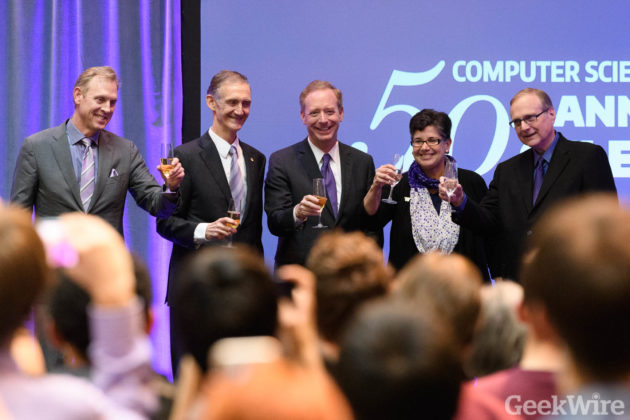
TB: I thought it was telling that Microsoft President Brad Smith, when he just gave the toast, emphasized the word our co-founder. You’ve had a somewhat complicated relationship with Microsoft over the years, if you read (Allen’s autobiography) Idea Man and go into that history. What did it mean for you that Microsoft donated the extra $10 million in your honor?
Paul Allen: I think it just reinforces my connection with the company that I co-founded. It’s just a very generous component of the whole funding, and I’m glad Microsoft stepped up and did it.
Alan Boyle, GeekWire: Is there a special significance to rounding it out to $50 million for 50 years (of UW computer science)?
Ana Mari Cauce: We thought it was a good number. 50 years, $50 million. Seemed right.
AB: Todd mentioned that you are the idea man. It’s not just you saying that. A lot of people say it, and today it was said, you are the person who focuses on the big picture. You’ve mentioned some of the things you’re watching, but is there a big picture or a big idea that five or 10 years from now, people will appreciate more than they appreciate today?
Paul Allen: It’s funny to think about it almost from a journalistic perspective because back in those days, you could follow everything that was going on in the computer industry by reading four or five publications: Computer Design, Datamation, ComputerWorld. There was like a half-dozen of them. Now, there’s so much going on, and everybody is trying to figure out the future, and you’ve got giant corporations trying to figure out the future, too.
Then you’ve got people that will simplify these things like artificial intelligence, and say, something will happen in five years. No, no. These things are so complicated, and biology is so complicated, we’re not going to get to the bottom of solving them for a while. But we should get started. And that’s what I’ve tried to do with my initiatives on the brain and with artificial intelligence, and to take a different approach than other people have. So it’s all fascinating stuff. Augmented reality. There’s so many areas that I think are … It reminds you a little bit of the early days, when you saw the first few PCs or the first graphics user interface on the XEROX Alto, and you said, oh my gosh, imagine what this is going to be in 10 years. Or you saw the 8008 chip. I’d be lobbying Bill, let’s do a BASIC for the 8008, and he said, it’s too slow, and he was right, but you can imagine down the line, these things are going to be ubiquitous, and it’s become beyond that.
AB: Since I’m focused on space, can you talk a little bit about the road ahead for Stratolaunch and maybe some of the other things that you have going on in the space frontier?
RELATED: Bill Gates on global health, clean energy, Trump, Microsoft and the future of the world
Paul Allen: Well, the unique thing about Stratolaunch — one of the unique things — is it doesn’t require a fixed launchpad. So there’s no staging and waiting for launch. You can imagine systems that are very flexible and for missions where you want to launch satellites into orbit at different angles, and look at things from different angles quickly, it’s pretty much ideal, for missions requiring more flexibility. Then there’s the fact that just doing an air launch gives you an advantage of probably 30 percent in performance.
The plane is really coming along. We’re going to hopefully be flying it later this year at some point. We’re not going to announce the date right now but hopefully we’re going to see that. I mean, it is … I can’t figure out the right adjective. Is it ginormous? I don’t know. It’s pretty darn big. Like the tail is 50 feet high. Just the tail. It’s probably the biggest carbon composite vehicle ever constructed, with a wingspan bigger than a football field. So it’s really big, and it can carry a vehicle that’s hundreds of thousands of pounds up into orbit.
What everybody’s trying to solve is, what is the most cost-effective way of getting things to orbit, because now you’re seeing so many more applications of satellites to watch things happen on the ground. In my case, I’m interested in watching things like illegal fishing, watching the changes to our biosphere from orbit, too, so there’s many new applications that are going to come from these small satellites, and communications applications, too. The demand for these small satellites is increasing dramatically, but who’s going to capture the market? We have some unique approaches, and everybody is looking at reusability, too, so we’ve got some things we’re thinking about there.
TB: Since the election, people like Elon Musk, Jeff Bezos, Bill Gates, Satya Nadella, they’ve been engaging with the White House on issues related to innovation, and of course Vulcan has had a strong role in public policy initiatives. Smart cities, climate change, conservation, infectious disease. How do you expect to be involved in public policy going forward in light of the transition in the other Washington?
Paul Allen: So far, I haven’t been involved directly like that. Especially in the areas related to perhaps some space things, there might be something in the cards in the future, but there’s nothing I’m going to talk about today. But clearly, everybody that’s interested in the frontiers of science sees the challenges the planet’s going to encounter, and some of these areas of public policy that have to do with pandemics, there’s so many different areas of policy that all of us that care about the world going forward would like to engage the government more on. But the government’s been fully occupied with many other issues up to this point.
Conclusion: So above is the A conversation with Microsoft co-founder Paul Allen: ‘It really is a golden age of what’s possible’ article. Hopefully with this article you can help you in life, always follow and read our good articles on the website: Ngoinhanho101.com

